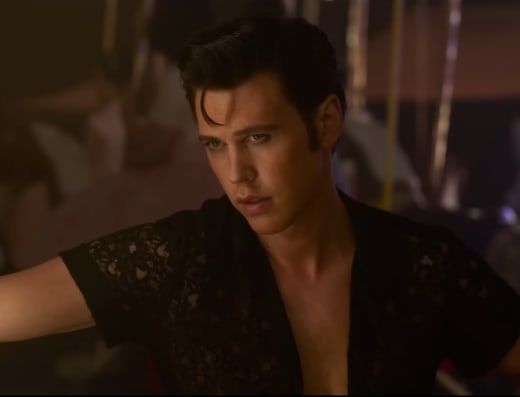As Back to Black Trailer Draws Criticism, is it Time to Give the Biopic Genre a Rest?

The past year saw a glut of biopics, and there are many more to come.
On the horizon are movies about Bob Dylan (A Complete Unknown with Timothee Chalamet), Michael Jackson (Michael with Jaafar Jackson), Shirley Chisolm (Shirley with Regina King), and many others.
Biographical pictures can be a vehicle to introduce a star from the past to the younger set, a la Elvis and then Priscilla. Or to bring a lesser-known historical figure like Oppenheimer to the forefront of our consciousness.
Other times, rather than being educational, a biopic can sensationalize a tragedy or scandal, which could leave a bad taste in the mouths of fans. This was the case with the Tommy Lee and Pamela Anderson miniseries.
Biopics are not a new genre for Hollywood. They are part of the ebb and flow of popularity. The vehicle is always around, sometimes as a small interest piece and, every now and then, a blockbuster.
We’ve seen many historical figures, politicians, and musicians get the biopic treatment. Musicians are big right now. The aforementioned Elvis, Bob Marley, and now Amy Winehouse with Back to Black is set to open soon.
Many biopics take on an arthouse quality, and while they are shown in mainstream theaters, they are often relegated to the smallest theater possible. Given this treatment, it often seems as if the studios are assuming that these movies will not draw large audiences.
Yes, Elvis’ life was interesting, but if you aren’t a fan of his music or of Austin Butler, it might not occur to you to see the movie. That’s not to say it didn’t do well. The flick grossed over $250 million worldwide.
One Love, chronicling Bob Marley’s life, wasn’t far behind, taking in almost $200 million.
Every now and then, a biopic turns out to be a blockbuster. It is not clear why some become massive hits while others remain in the background.
In 2018, Bohemian Rhapsody hit the screens, and it was a smash. Why? Was the timing ripe? Is Queen’s music so well-known and beloved that everyone runs to see it?
Perhaps it premiered in a year with fewer mainstream big movies.
Either way, it took in over 900 million dollars worldwide and earned numerous awards, at the Oscars and the Golden Globes.
And for the first time, a biopic was a blockbuster, something to which the studios could aspire.
And a few years later, Universal Pictures achieved that with Oppenheimer, which raked in over 950 million dollars.
It was a smash, possibly made even more popular by the odd release pairing with the Barbie movie, which resulted in its own portmanteau – Barbenheimer.
Would that movie have struck quite as big without its pink companion? Possibly. But now it seemed that any biopic could pull in huge numbers, resulting in a race for more content.
So, have we reached a saturation point? Does everyone merit a biopic? Is it simply the path of least resistance to release a biopic rather than starting from scratch?
The upcoming Amy Winehouse story, Back to Black, has garnered much negative press. The comments on the web are likely not what the producers and stars were hoping for.
While Winehouse was popular in life, will this movie glamorize her death? Do we really need to do a deep dive into her substance abuse and heartbreak?
Fans of Winehouse watched the documentary AMY, which premiered in 2015, and found it honest and true to her as an artist and a person.
Research on Amy’s career shows that she was more interested in intimate performances than huge spectacles and would not have appreciated this level of scrutiny.
However, as studios and producers search for content, having a documentary as a jumping-off point must have made the prospect of an Amy Winehouse biopic very enticing.
Music lovers who aren’t necessarily fans of the star may go see it, but given the negativity, it is unlikely to mimic the success of Elvis.
If a movie isn’t a big draw and a studio isn’t expecting huge box office numbers, then why the glut of biopics?
Perhaps because they are easier to make since there are no CGI or special effects, making them far less expensive to produce.
Often (but not always), since the film is focused on one person, the cast can be smaller, also allowing the studio to spend less.
Further, the story is already there. Biopics can utilize news clippings, interviews with stars, information from their families, and more. And every now and then, as with Winehouse, there may already be a documentary.
And, while a script still needs to be written, there isn’t a lot of creativity involved.
If the film does well, the studio benefits. If the film doesn’t do well, there’s not a lot of risk.
Will we see a pulling back on the genre? Not likely. With the success, even modest successes, there is no reason to stop.
As long as the risks outweigh the rewards, the studios have no reason to pull back on producing them.
Even with the backlash against Back to Black, people will still go see it.
Diehard fans, music fans, and even the ghouls interested in the tragedy will buy tickets.
So, expect to see more biopics coming down the pike because until Hollywood finds something new, like it or not, we’re stuck with them.
Over to you, Fanatics.
Are you a fan of the biopic or entirely over the genre? Will you head to the theater to see Back to Black? Drop a comment below!
Lucy Peel is a staff writer for TV Fanatic.
Source link










